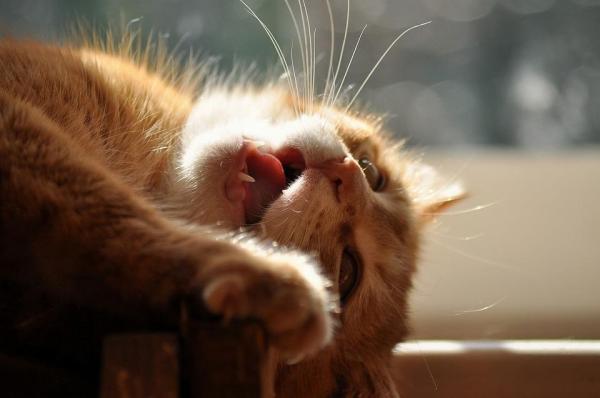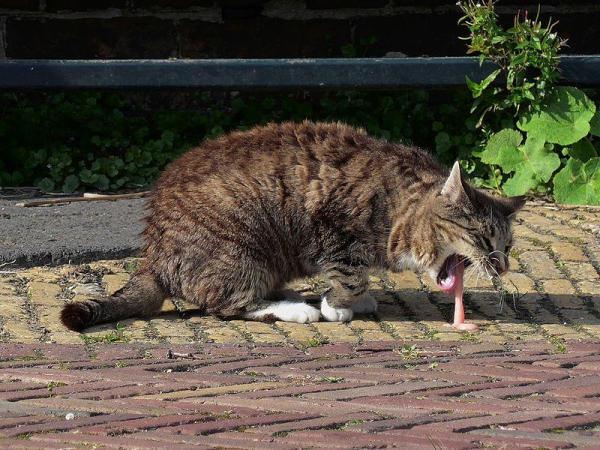
Thanks to a diet of fish-based treats, commercial cat feed and whatever they might discover out on their travels, even a healthy cat's breath isn't always the most pleasant of aromas. It can often have a little bit of a fusty odor which is not always the best when they are nudging their mouth near our nostrils. This is not the same as saying your cat's breath stinks. When a cat has a particular foul smelling mouth, it can be a worrying clinical sign. This is particularly the case in older felines.
At AnimalWised, we ask why does my cat's breath stink so bad? We look at the causes of bad breath in cats and find out what we need to do to treat this problem.
Bad breath in cats
When our cat's breath stinks, it means it gives off an odor which is particularly acrid. It is important to differentiate between this and the smell of a healthy cat's mouth. Due to their diet and activities, it is common for a cat's breath to smell a little funky to us. It is only when the cat's mouth gives off a truly unpleasant odor that we should be worried. Here are some of the most common reasons a cat's mouth stinks.
Gingivitis in cats
The gingiva are the mucus membranes in a cat's mouth which are commonly known as gums. When they are inflamed, it is known as gingivitis. When this is caused by an infection that spreads to the whole mouth, it is known as gingivostomatitis in cats.
There are many routes of infection for a cat's gums. They may eat something which pierces their gums and opportunistic bacteria enter the wound. They may chew on something covered in harmful bacteria which infect the gums more directly. These infections are usually accompanied by a fishy or rotten odor. There will also likely be pain in the mouth, redness of the gums and other signs along with the swelling.
The pain of the infection can cause the cat to stop eating. This can even lead to the cat losing weight or developing other serious problems. Treatment of bacterial infections will require antibiotics and analgesics may be used to manage the pain. A soft food diet for cats may be required until the infection subsides.
Periodontal disease in cats
Periodontal disease in cats is an unfortunately common problem in felines. Clinical signs include redness of the gums, tartar build up mand, eventually, tooth loss. It is not one problem, but a general term for various infectious conditions which is most commonly associated with buildup of bacterial plaque.
It is distinguished from gingivostomatitis in that there is no inflammation around the tooth. There may be pus and bleeding with simple contact of the affected area. If a foreign body has become embedded between the teeth, it may be the cause of the bad smell.
Other symptoms of halitosis in cats
If we are not able to examine the mouth, we may detect other symptoms such as hypersalivation, difficulties eating or anorexia. This can lead to the cat's coat becoming lackluster and the cat may stop grooming themselves as much. It is not always easy to solve an oral problem because viruses such as caliciviruses may be involved. These are characterized by causing ulcers.
In the case of periodontal disease, an ultrasound mouth cleaning is performed. It is essential to anesthetize the cat for this procedure. Damaged teeth are extracted. Extraction is also the treatment of choice in severe or unresponsive gingivostomatitis. Gingivitis is not the only cause that explains why a cat's breath stinks (halitosis). Tumors can also grow in the mouth or nose or infections develop that also end up causing a bad smell.

Halitosis in cats caused by internal problems
Although it is common for a cat to have bad breath thanks to problems in their mouth, internal issues can also result in halitosis. Feline kidney disease is one such problem. In these cases, the cat's breath stinks thanks to the accumulation of substances which should otherwise have been eliminated by the kidneys. When renal failure occurs, the kidneys are unable to process them. It can be accompanied by systemic symptoms such as hair loss, anorexia and others.
Kidney failure is more common in older cats and can present acutely or chronically. It is vital you take the cat to a veterinarian. Irreversible damage will likely have occurred, but treatment can be prescribed that improves the quality of life of our cat. Switching them to a special diet for kidney problems, encouraging them to drink and administering the necessary drugs to treat the symptoms that arise, increases their quality of life.
A slightly fruity odor is related to another systemic disease, specifically diabetes in cats. This can appear with symptoms such as increased appetite and water consumption. The cat may remain thin and have increased urination. It is a chronic disease, but it can be controlled with diet and insulin administration.

Feline halitosis due to vomiting
We are not always abole to observe that a cat has vomited. If they have access to the outside or they do it somewhere in the home we do not see, it will be difficult to know. Vomit could be the reason why the cat has bad breath.
Vomiting in cats is a symptom of many different diseases and issues. It can range from a mild stomach upset to serious, life-threatening illnesses. Cats may also regurgitate a lot if they have hairballs, something more common in types of longhaired cats. If a cat vomits regularly or over a prolonged period of time, it will be a veterinary emergency. We need to take them to a clinic to determine the cause.
Another cause of intermittent vomiting that lasts over time is kidney disease. In this case, the smell that the cat's mouth will give off will be similar to acetone, but not always. This is especially in the initial phases of the pathology.
Find out more reasons for vomiting and diarrhea in cats with our related article.

Cat's oral hygiene
It is possible for your cat's breath to stink for more general reasons. Poor oral hygiene may result in bad breath, even if they do not have a specific health problem such as gingivitis. It may not be a big problem itself, but ignoring it can make more serious issues more likely. For this reason, it is important to care for the oral hygiene of our cat. This requires:
- Dental cleaning: accustom the cat to dental cleaning as soon as possible. There are special toothbrushes and toothpastes for cats which we need to use as others can cause harm or are simply unpleasant for the cat.
- Take care of diet: offering foods that favor the cleaning of the teeth and never give them sugar or food which does not meet their nutritional requirements.
- Veterinary check-ups: go at least once a year and include an oral examination, as well as a blood and urine tests. This is especially for older cats as they are more prone to systemic diseases which need to be detected early.

This article is purely informative. AnimalWised does not have the authority to prescribe any veterinary treatment or create a diagnosis. We invite you to take your pet to the veterinarian if they are suffering from any condition or pain.
If you want to read similar articles to Why Does My Cat's Breath Stink So Bad?, we recommend you visit our Other health problems category.
- Palmero, ML Feline chronic gingivostomatitis. Gattos Feline Clinical Center.